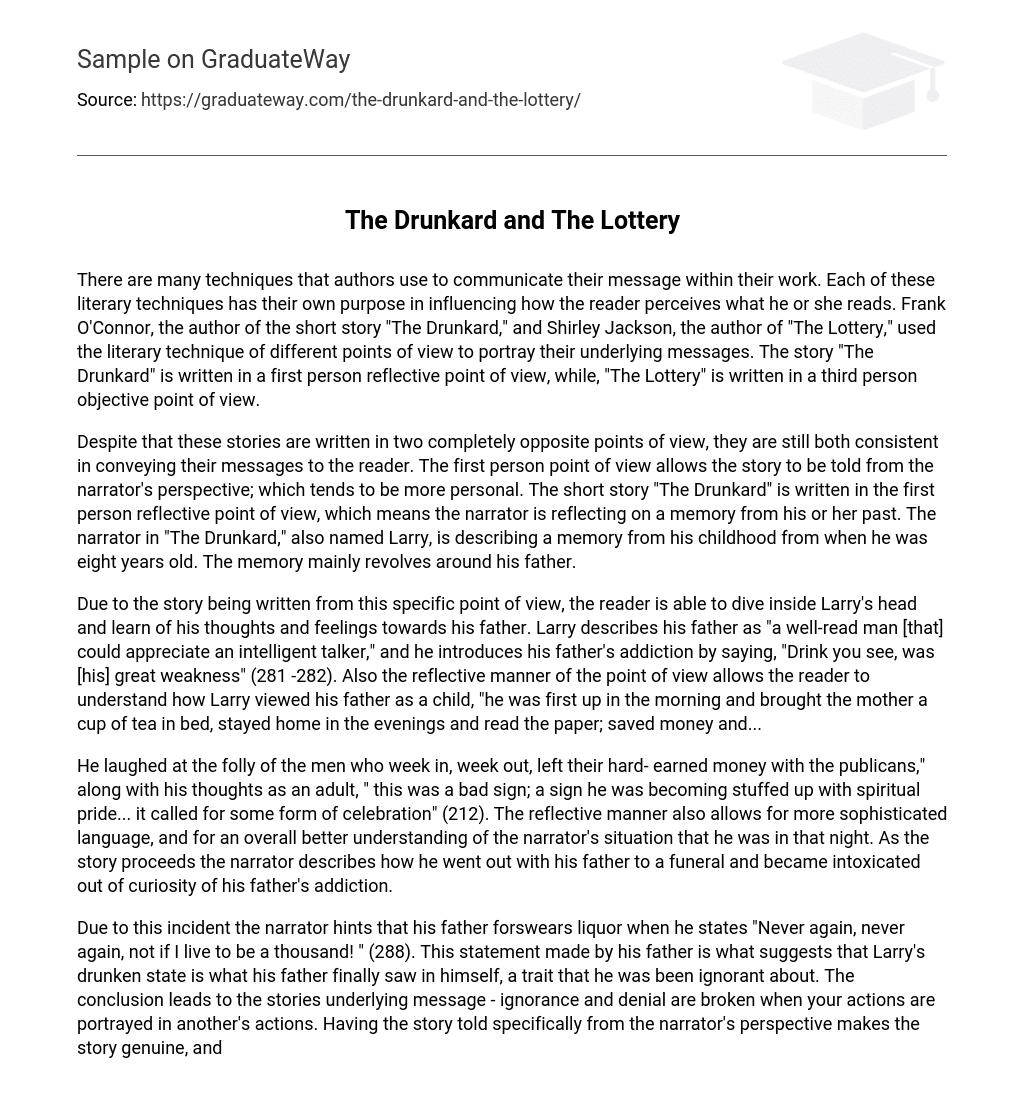There are many techniques that authors use to communicate their message within their work. Each of these literary techniques has their own purpose in influencing how the reader perceives what he or she reads. Frank O’Connor, the author of the short story “The Drunkard,” and Shirley Jackson, the author of “The Lottery,” used the literary technique of different points of view to portray their underlying messages. The story “The Drunkard” is written in a first person reflective point of view, while, “The Lottery” is written in a third person objective point of view.
Despite that these stories are written in two completely opposite points of view, they are still both consistent in conveying their messages to the reader. The first person point of view allows the story to be told from the narrator’s perspective; which tends to be more personal. The short story “The Drunkard” is written in the first person reflective point of view, which means the narrator is reflecting on a memory from his or her past. The narrator in “The Drunkard,” also named Larry, is describing a memory from his childhood from when he was eight years old. The memory mainly revolves around his father.
Due to the story being written from this specific point of view, the reader is able to dive inside Larry’s head and learn of his thoughts and feelings towards his father. Larry describes his father as “a well-read man [that] could appreciate an intelligent talker,” and he introduces his father’s addiction by saying, “Drink you see, was [his] great weakness” (281 -282). Also the reflective manner of the point of view allows the reader to understand how Larry viewed his father as a child, “he was first up in the morning and brought the mother a cup of tea in bed, stayed home in the evenings and read the paper; saved money and…
He laughed at the folly of the men who week in, week out, left their hard- earned money with the publicans,” along with his thoughts as an adult, ” this was a bad sign; a sign he was becoming stuffed up with spiritual pride… it called for some form of celebration” (212). The reflective manner also allows for more sophisticated language, and for an overall better understanding of the narrator’s situation that he was in that night. As the story proceeds the narrator describes how he went out with his father to a funeral and became intoxicated out of curiosity of his father’s addiction.
Due to this incident the narrator hints that his father forswears liquor when he states “Never again, never again, not if I live to be a thousand! ” (288). This statement made by his father is what suggests that Larry’s drunken state is what his father finally saw in himself, a trait that he was been ignorant about. The conclusion leads to the stories underlying message – ignorance and denial are broken when your actions are portrayed in another’s actions. Having the story told specifically from the narrator’s perspective makes the story genuine, and easier for the reader to connect with, which smoothly incorporates the message.
On the other hand, the short story “The Lottery” is written in the third person objective point of view. Stories written in the point of view are equivalent to watching a movie. It’s unique because the narrator only observes the character’s actions, unlike the first person point of view, the reader cannot enter the character’s mind. Having the story written in this manner leaves a lot of room for speculation. Only knowing the character’s actions, and not the reason behind it aids in the creation of a dark and mysterious tone.
When the narrator in “The Lottery” describes how the character’s “jokes were quiet and [how] they smiled rather than laughed,” the reader can only assume why the scene is tense and mysterious (194). the form of writing also leaves more room for foreshadowing, this is made apparent in many parts throughout the story. For example, when the author writes, ” There was a hesitation before the two men, Mr. Martin and his oldest son, Baxter, came forward,” which shows the reader how they were nervous and hesitant about something to do with the event (195).
Also when one of the characters say, ” ‘Lottery in June, corn be heavy soon,’ “which is a hint of some sort of sacrifice that has to be tied to the lottery (198). The point of view also assists in the huge twist at the end of the story when the reader finds out that the lottery is a selection of a human sacrifice, whom will be stoned to death. Even though the thoughts behind the character’s actions are not revealed, the message is; humans are habitues creatures by nature.
Despite the major differences in these two points of view, there are some similarities; these two completely opposite points of view, each in their own unique way, were both consistent in conveying the message in both “The Drunkard” and “The Lottery. ” Whether it be through the character’s perspective as done in “The Drunkard” or their actions as done in “The Lottery,” both stories were understood and enjoyable. Another aspect that both points of view share is the mystery factor. In both “The Drunkard” and “The Lottery” not all the character’s perspectives are known.
Only the perspective of the narrator in “The Drunkard” is known, and in “The Lottery” no character’s perspectives are known. Certain literary works such as “The Drunkard” and “The Lottery” can only communicate their messages if they are written in a specific way. Frank O’Connor, the author of the short story “The Drunkard,” and Shirley Jackson, the author of “The Lottery,” used the technique of using a specific point of view to influence how the reader perceives their story. Despite that the stories are written in two completely different points of view, they are still both consistent in conveying their messages to the reader.





